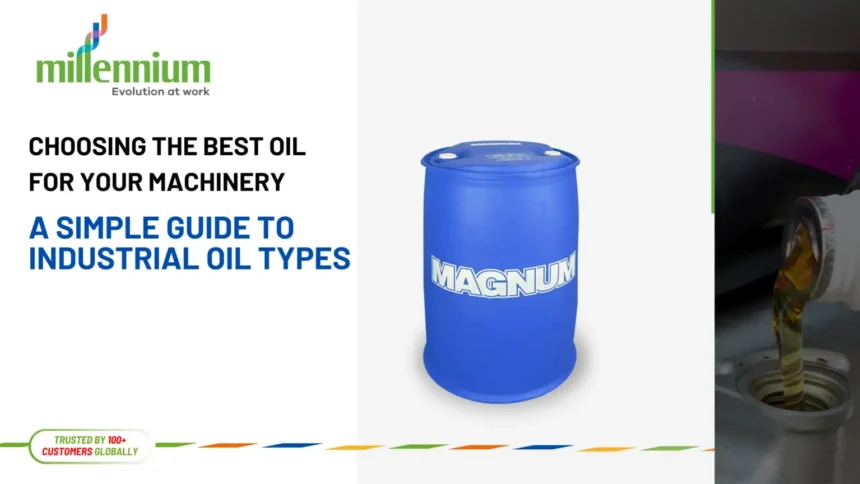Industrial oils play a crucial role in the smooth and efficient operation of machinery across various sectors. From lubricating moving parts to protecting against wear and tear, the right industrial oil ensures that machines run at optimal levels, reducing downtime and extending equipment life. Understanding the different types of industrial oils and how to select the appropriate one for your machinery is vital for maintaining operational efficiency and reducing costs.
Understanding Industrial Oil
Industrial oil is a broad category of lubricants specifically formulated to meet the demands of heavy-duty machinery and equipment. These oils are designed to minimize friction, reduce wear, and protect against corrosion and oxidation. They are used in a wide range of applications, including hydraulic systems, gearboxes, compressors, and turbines.
The formulation of industrial oils typically includes a base oil combined with additives that enhance specific properties such as viscosity, thermal stability, and resistance to oxidation. The type of base oil (mineral, synthetic, or biodegradable) and the combination of additives determine the oil’s performance characteristics, making it suitable for various industrial applications.
What Industrial Oil is and Its Significance in Machinery Operation
Industrial oil is not just a lubricant; it is a critical component in ensuring that machinery operates smoothly and efficiently. In industrial settings, machinery is often exposed to extreme conditions such as high temperatures, heavy loads, and constant friction. The right industrial oil reduces the wear and tear on moving parts, thereby extending the life of the equipment.
Moreover, industrial oils help to maintain the cleanliness of machinery by preventing the build-up of contaminants, such as dirt and metal particles, which can cause abrasion and damage. They also play a crucial role in dissipating heat, which is particularly important in high-temperature environments. By keeping machinery cool, industrial oils prevent overheating and the subsequent breakdown of components, ensuring that operations continue without interruption.
How to Choose the Right Industrial Oil?
How to choose the best industrial oil for your machinery requires a thorough understanding of the machinery’s operational requirements and the environmental conditions it operates in. The key factors to consider when selecting industrial oil include:
- Viscosity: Viscosity refers to the oil’s thickness and its ability to flow at different temperatures. Choosing the correct viscosity grade ensures that the oil provides adequate lubrication without being too thick or too thin.
- Additive Package: Different machinery requires oils with specific additives to enhance performance. For example, anti-wear additives are crucial for high-load applications, while rust and oxidation inhibitors are essential for machinery operating in humid or corrosive environments.
- Base Oil Type: The base oil’s origin (mineral, synthetic, or biodegradable) can significantly impact the oil’s performance. Synthetic oils, for instance, offer superior thermal stability and longer service life, making them ideal for high-temperature applications.
- Manufacturer Recommendations: Always consult the machinery manufacturer’s guidelines when selecting oil. These recommendations are based on the machinery’s design and operational needs.
Working of Industrial Oil
Industrial oils function primarily by forming a protective film between moving parts, reducing direct metal-to-metal contact, and thereby minimizing friction and wear. The oil’s additives enhance this function by providing additional protection against corrosion, oxidation, and thermal degradation.
In hydraulic systems, industrial oils also transmit power, converting the energy from the pump into mechanical force. In gearboxes, the oil lubricates the gears, reducing friction and heat generation. The cooling properties of industrial oils are particularly important in applications like compressors and turbines, where the oil absorbs and dissipates heat, preventing overheating and maintaining efficient operation.
Industrial Oils: Uses and Applications
Industrial oils are used in various applications, depending on the specific needs of the machinery:
- Hydraulic Oils: Used in hydraulic systems to transfer power, these oils must maintain stability under pressure and temperature variations.
- Gear Oils: Designed for gearboxes, these oils need high film strength to prevent wear and reduce friction.
- Compressor Oils: These oils must resist oxidation and thermal degradation to perform effectively in high-temperature environments.
- Turbine Oils: Used in turbines, these oils need excellent oxidation stability and water separation properties to ensure smooth operation.
Importance of Proper Industrial Oil Maintenance
Proper maintenance of industrial oils is essential for maximizing the lifespan of both the oil and the machinery. Regular oil analysis can detect contaminants, viscosity changes, and depletion of additives, allowing for timely oil changes and preventing potential equipment failures.
Oil filtration systems should be used to remove impurities and extend the oil’s life. Additionally, maintaining the correct oil level is crucial for effective lubrication. Overfilling or underfilling can lead to inadequate lubrication, increased friction, and overheating.
Conclusion
Selecting the right industrial oil is vital for ensuring the efficiency, reliability, and longevity of machinery. By understanding the specific requirements of your equipment and the environmental conditions it operates in, you can choose an oil that provides the necessary protection and performance. Regular maintenance and monitoring of industrial oil will further enhance machinery performance, reducing the risk of unexpected downtime and extending the life of your equipment.



